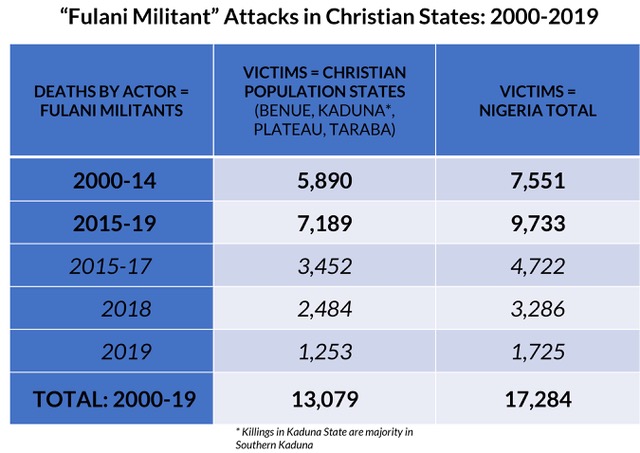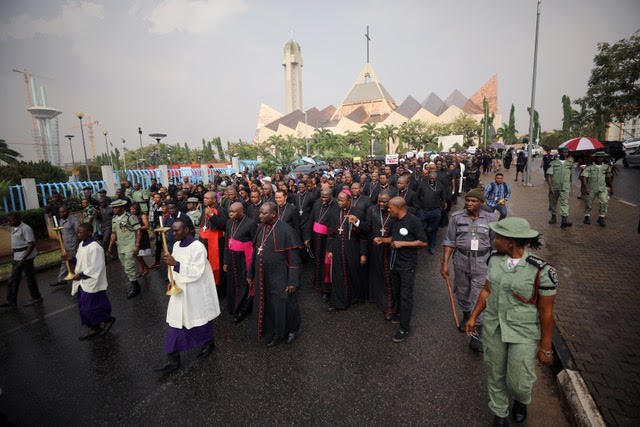
WINDSOR TERRACE — A priest and a nun, both Nigerian-born, say their homeland’s government deserves the blame for more than 13,000 murders of Christians since 2001.
Father Cosmas Nzeabalu and Sister Elizabeth Ogbu, both assigned to the Diocese of Brooklyn, told The Tablet that they believe the Nigerian government, led by President Muhammadu Buhari, has done little to prevent ongoing violence between Muslim cattle herders and Christian farmers.
The herdsmen predominately belong to the Fulani tribe from the arid north, while Christians, including Catholics, dominate the south’s verdant farmlands. The two groups want access to good agricultural land at Nigeria’s center, called the “Middle Belt.” Herdsmen have participated in the killing of 13,079 Christians between 2001-2019, according to estimates from the International Committee on Nigeria.
At the same time, Islamic militants from the group Boko Haram have resorted to terror, said Father Cosmas, coordinator of the Nigerian apostolate for the diocese.
“Boko Haram destroys churches and western education,” he said, “and then the herdsmen get into every nook and cranny with their cows. When the Christian farmers reject that, it results in them getting killed.”
Sister Elizabeth works at Catholic Telemedia Network, developing a digital-based curriculum for Catholic schools. CTN is a service of DeSales Media Group, the parent company of The Tablet.
She said the Fulani want “greener pastures” for cattle but added that “as time goes on, it turns out to be a religious thing.”
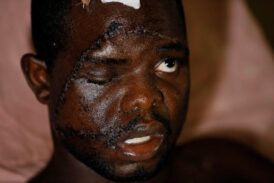
The proof is the violence spreading from the fields to churches in villages and suburbs. Clergy and worshipers, including children, are kidnapped or murdered, according to Sister Elizabeth.
“It’s not just about a fight that busts out,” she explained. “They go into churches and burn them down while people are inside worshiping. This is deliberate; it is planned.”
For example, Father Cosmas pointed to recent trouble in the state of Kaduna. In August, gunmen believed to be Fulanis arrived on motorcycles, killed one man, and burned down a Baptist church. They also held a teacher and four students hostage but released them in mid-October after a ransom payment.
The victims know the attackers aren’t from Boko Haram because they recognize them as herdsmen encountered in the fields, Sister Elizabeth said.
Attackers typically use clubs, rocks, machetes, and crude hunting rifles made from antique and modern gun parts. They also weaponize cattle, spurring stampedes to trample crops.
But now, the herdsmen brandish AK-47 rifles. A single AK-47 costs a few hundred U.S. dollars — probably too expensive for an average herdsman’s wages. Sister Elizabeth, therefore, thinks they’re getting help.
“There is no way they can get those sophisticated arms without sponsors,” she said. “I am not sure if it’s Boko Haram or if the government sponsors this, but there could be some interchanges because they all have the same mission.
“I think they are trying to Islamize the entire country.”
In recent years, Nigerian armed forces have battled Boko Haram, forcing the group’s activities to just a few areas.
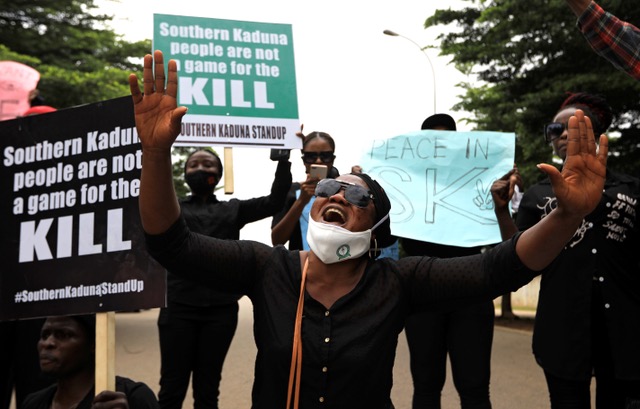
Father Cosmas complained the government is too easy on herdsmen. He said they might not be acting at the government’s behest, but President Buhari, himself a Fulani, seems uninterested in restoring peace.
“How does he say he’s not part of the problem?” the priest asked. “You are the commander-in-chief. Why are you not putting out a clear warning against such killings and such behavior? “It shows he does not have regard for Christians.”
Herdsmen and Boko Haram aren’t the only problems in Nigeria.
People recently died protesting alleged police brutality at the hands of the so-called “Special Anti-Robbery Squad” (SARS) of the Nigeria Police. The nation is also struggling with COVID-19.
Nigeria is now of particular concern for Pope Francis. He offered a prayer for the nation after his Aug. 15 angelus on the solemnity of the Blessed Virgin Mary’s assumption.
“Let us invoke her intercession,” he said, “for all the situations in the world that are most in need of hope: hope for peace, for justice, hope for a dignified life. Today I would like to pray in particular for the population of the northern region of Nigeria — victim of violence and terrorist attacks.”
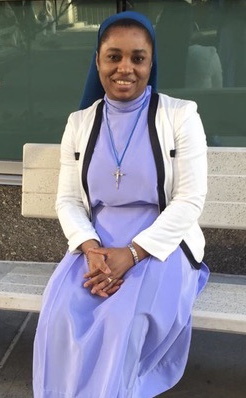
Pope Francis mentioned Nigeria again after his Oct. 25 angelus, this time addressing the SARS protests.
“I follow with particular concern the news coming from Nigeria about the recent violent clashes between law enforcement agencies and some young protesters,” he said. “We pray to the Lord that all forms of violence will always be avoided, in the constant search for social harmony through the promotion of justice and the common good.”
Father Cosmas and Sister Elizabeth urge prayer to address Nigeria’s turmoil, but they also call for action.
Father Cosmas said the U.S. government needs to make Nigeria a priority, acknowledge the violence is not unnoticed, and demand that it end.
“If there is no action coming from America,” he said, “the whole thing will continue.”
Sister Elizabeth agreed.
“To me, prayer is the key,” she said, “but we also need to put in some actions to prayer. To me, it’s about speaking out when something happens. The church in Brooklyn can join in and say these are our brothers and sisters in Christ.
“Together, that voice will be louder, and I think that will help.”
